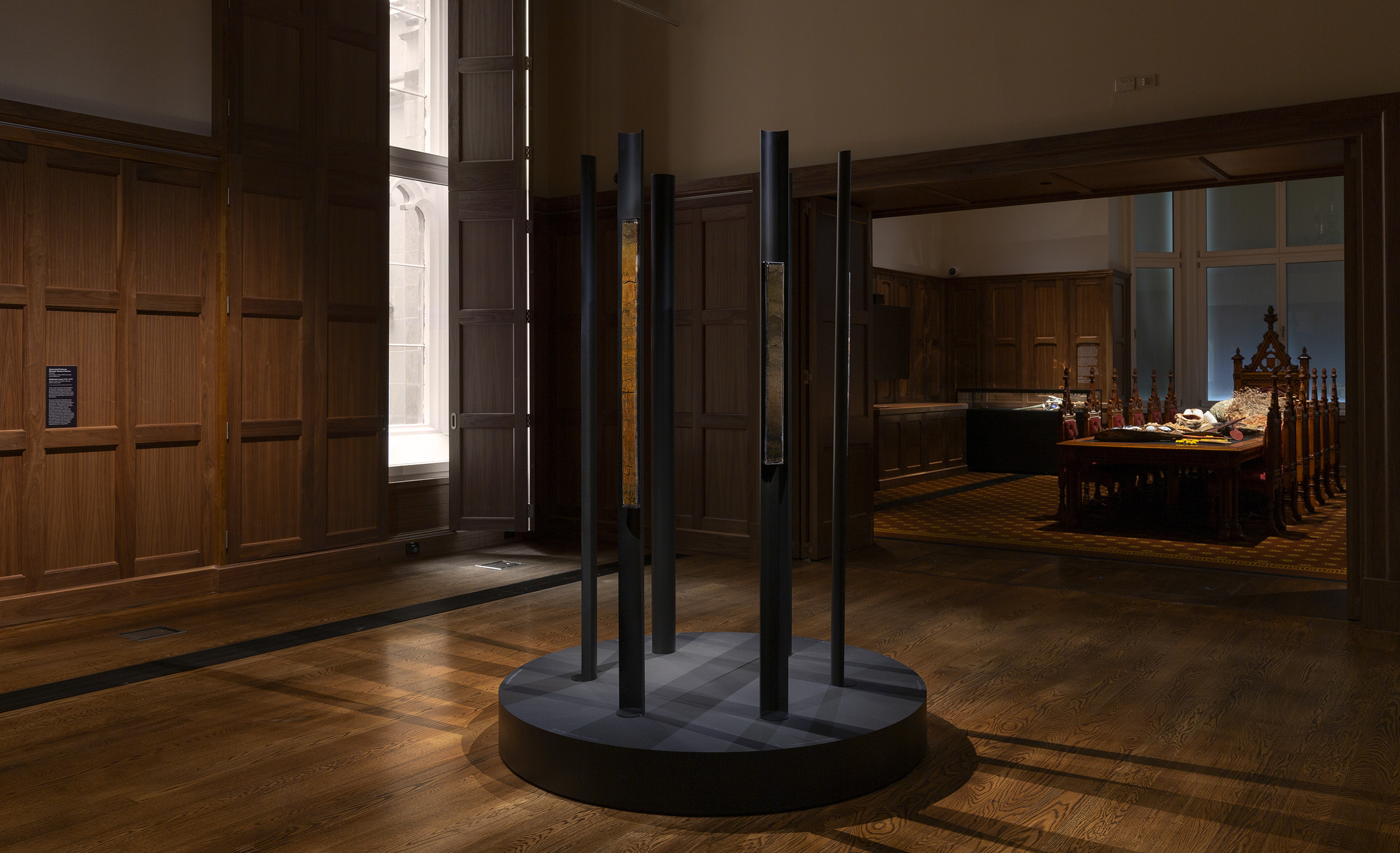


Sediment cores 2019-2021
organic matter, minerals, charcoal, pollen, epoxy resin
Courtesy of Associate Professor Michael-Shawn Fletcher
These earth cores form the foundation for the work undertaken by Wiradjuri geographer and academic Associate Professor Michael-Shawn Fletcher, who extracts these samples from deep within the earth to reveal hidden stories within their layers. Preserved through compression over centuries, these cores speak through the organic matter and charcoal trapped within them, making what Dr Fletcher describes as ‘a sedimentary storybook’.
Through analysing this material Dr Fletcher uses modern science to study ancient science, finding much evidence that attests Aboriginal land management practices, most pertinently, the application of cultural burning regimes. This work speaks to our past, our present and, perhaps most importantly, provides scientific evidence that may guide our future in paving the way for cultural burning practices to be more widely understood and re-invigorated.
Wiradjuri
born Carlton, Victoria 1975
lives and works Melbourne
Associate Professor Michael-Shawn Fletcher is a descendant of the Wiradjuri and a geographer interested in the long-term interactions between humans, climate, disturbance, vegetation and landscapes in the southern hemisphere. Michael’s research group focuses on understanding how Southern Hemisphere landscapes evolve at scales ranging from tens to millions of years using microfossils stored in wetland sediments, along with tree-rings to understand long-term forest dynamics. Michael’s recent research has a particular emphasis on how Indigenous burning has shaped the Australian landscape and how Indigenous knowledge needs to be meaningfully incorporated into landscape management to tackle many of the environmental challenges we face today. He is Director of Research Capability at the Indigenous Knowledge Institute, a cross-faculty research institute at the University of Melbourne that aims to advance research and education in Indigenous knowledge systems. Michael is also Associate Dean (Indigenous) in the Faculty of Science at the University of Melbourne, and a panel member of the Australian Research Council College of Experts.
Website
These columns represent windows through time. They allow us to look back through the history of the earth. You can go back millions of years or in the case of the columns there, they go back maybe 100 years or 1,000 years, and they record everything that's been happening in the landscape through that period of time.
That can be changes in climate is recorded in the types of chemicals preserved in the material. Changes in vegetation, which is recorded in the kinds of pollen or plant remains that find their way into a wetland and settle at the bottom and changes in fire. Our cultural burning burns grassy fuels. We'll get grassy kinds of charcoal in the sediments. Whereas catastrophic wildfires produce a lot of woody charcoal. And we can piece all of these fragments of the past together to paint a picture of landscape change through time.
This information is critical. It's critical for asserting the fact that landscapes were healthier when we were managing them. That many of the species that we are losing at the moment are the result of not managing country. And the big catastrophic wildfires that we constantly see are because we're not managing country anymore. We can really assert our agency that we already know, that our oral traditions tell us and that our knowledge tells us, this data that we gather is hopefully a kind of empirical narrative that can speak to the power structures today that can open up the capacity for us to return to country and manage country.
Our people have cared for and managed Country since we arrived here, at least 70,000 years ago, if not more. And that's the essence of who we are. Our very definition is of being in country, of looking after country, caring for Country so country cares for us. And we're no longer able to do that. And we have a dominant world view at the moment in society, that views very different aspects of the environment as high value. Concepts of wilderness, for example, or the absence of people from landscapes are highly valued. Whereas almost any human activity in a landscape is considered as a negative.
And this has led to laws, rules, and restrictions on how we can manage our country. And that's having a negative impact on us. Aboriginal people hold the key or the ways to operate in this landscape in a safe and sustainable way. And many of, if not all of the environmental problems that we're facing today are partially, if not completely, the result of the removal of our management from Country.
And high biomass landscapes, forested landscapes, all the way through to deserts, require management. They've evolved and built themselves around our management for tens of thousands of years and we need to get our management back in.
Close